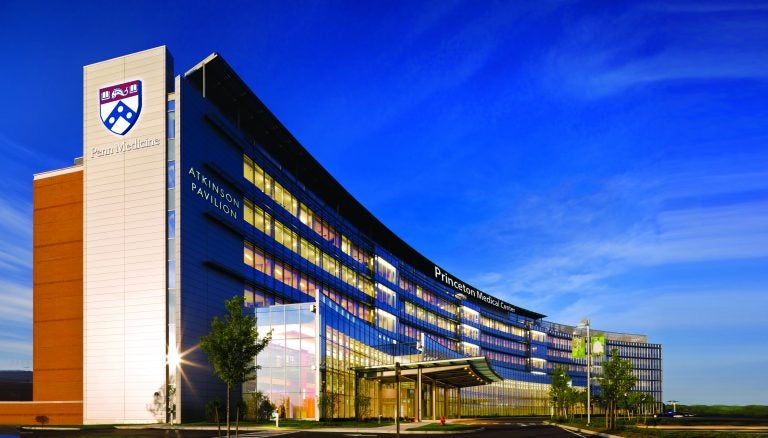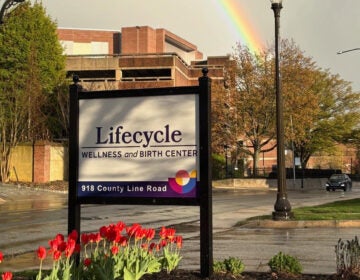Amid regulatory uncertainty, Penn Medicine acquires Princeton HealthCare
The University Medical Center of Princeton will become the sixth hospital in the University of Pennsylvania Health System.

Penn Medicine's latest acquisition in Plainsboro, New Jersey, will be known as Penn Medicine Princeton Health. (Penn Medicine rendering)
As of Tuesday, Penn officially owns Princeton.
Penn Medicine has finalized the acquisition of Princeton HealthCare System following a yearlong regulatory approval process.
The University Medical Center of Princeton — which, despite the name, is located in Plainsboro, New Jersey, and is not affiliated with the Ivy League university — will become the sixth hospital in the University of Pennsylvania Health System, which has also added hospital networks in Lancaster and Chester counties in recent years.
With the addition of the Princeton HealthCare facilities, now renamed Penn Medicine Princeton Health, and their 3,000 staff and 1,100 physicians, Penn Health System’s annual revenues will top $7 billion.
Since it was founded in 1993 to oversee the operation of Penn’s hospitals, clinics, and physician groups as a subdivision of Penn Medicine, the Penn Health System has steadily grown into one of the region’s dominant forces in the health care market, said Lawton Burns, the James Joo-Jin Kim Professor of Health Care Management at the University of Pennsylvania’s Wharton School.
That’s given Penn more stability than some competitors — and more bargaining power with insurance companies, who pay for the vast bulk of medical care. That, in turn, has made Penn Medicine attractive to smaller hospital groups looking to join a larger network.
So when Princeton put itself up for acquisition in 2015 after posting a $736,000 operating loss on $437 million in revenues, Penn had a leg up on the 16 other potential partners that came courting.
Despite the small loss in 2015, Burns described Princeton, which built a $355 million 308-bed hospital in 2012, as a strong financial acquisition for Penn Medicine.
“Penn is not picking up weakling hospitals or hospitals that are struggling,” said Burns. “Penn’s actually picking up hospitals that are doing really well.”
“Princeton is the major hospital in that part of New Jersey and they became available for acquisition,” he said. “Penn jumped at the opportunity because they got a very good deal on it.”
Shifting strategy
According to Burns, this hospital group merger differs from those that have been common in the health care industry in recent years. Health care providers have been consolidating because of the Affordable Care Act, or Obamacare.
“Often these deals are precipitated by federal legislation,” said Burns, “whether passed or not.”
When Obamacare became law in 2010, it led a spate of smaller, weaker hospitals to seek the stability of a larger health care network. And as the Republican Party has attempted to repeal and replace the law, that instinct to herd has returned.
“Every time the federal government steps in and does something to the health care system, the hospitals respond by forming systems and getting bigger,” said Burns.
Penn Medicine is big enough to weather the regulatory storms that might sink smaller medical groups, said Burns.
Obamacare also changed how some hospital groups are paid, tying reimbursement amounts to improvements in the quality of care and reductions in its total cost. That shift from a payment per procedure or short hospital stay toward longer term health outcomes has drawn smaller medical facilities toward larger ones such as Penn.
“People want to join Penn because of what I call these market signals that came about as a result of the Affordable Care Act,” said Penn Health System CEO Ralph Muller.
For Penn, that’s meant investment in more outpatient-care facilities across the region, so it’s easier to keep patients in their system for ongoing treatment. Previously, such patients might have left after a one-time trip to Philadelphia for a major procedure. Given that so many of their patients already cross the Delaware River to go to one of Penn Medicine’s three hospitals in the city, growing in the Garden State just made sense.
“We get 25 percent of our patients from New Jersey, and we wanted to have a bigger physical presence in New Jersey,” said Muller.
Muller expects Penn Medicine to continue to grow, but he noted that the health system’s enviable size and stability mean it can be selective in choosing new partners.
“There’s a lot more hospitals that come to us that we say no to,” said Muller.
“For example, I was approached yesterday by a hospital in Pittsburgh,” said Muller, who noted how far that city sits from Philadelphia. “I said, ‘No, thank you.’ ”
Disclosure: Ralph Muller serves on the WHYY board of directors.
WHYY is your source for fact-based, in-depth journalism and information. As a nonprofit organization, we rely on financial support from readers like you. Please give today.




